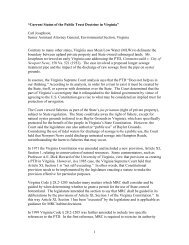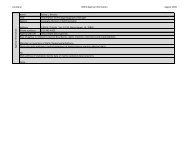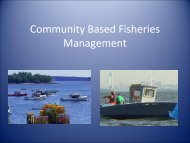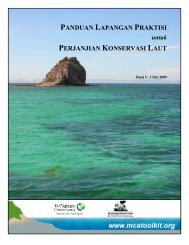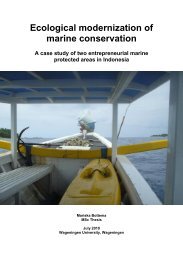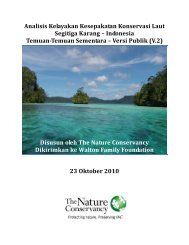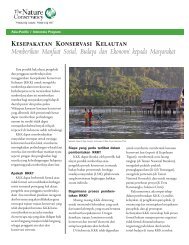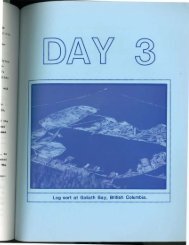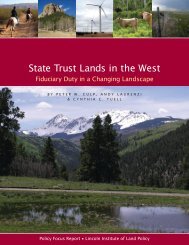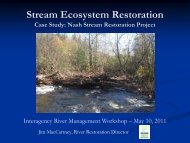Presentation
Presentation
Presentation
You also want an ePaper? Increase the reach of your titles
YUMPU automatically turns print PDFs into web optimized ePapers that Google loves.
Three basic questions:• How will climate change affect GreatLakes water levels and the lands belowthem?• What will altered levels do to habitats?• How can management agencies and legalregimes adapt?
Climate change is here. As itdevelops, the Great Lakes willrespond differently from theocean coasts.
With climate change, the GreatLakes “go south”
Projected Effects in the Lakes• Later freeze-up• Earlier ice-out• Warmer watertemperatures• Reduced ice cover• More evaporation• More lake-effectprecipitation
Projected effects in watersheds• Longer growingseasons• More transpiration• More droughts• “Flashier” runoff• Increased demandson groundwater
The bottom line:Great Lakes levels may dropby 2-323 meters (6.5-10ft.)this centuryMany submerged lands willemerge
Many parts of the Great Lakesmay be affected
Uncertainty in Prediction:The “St. Clair Drainhole”
Focus Area: Lake Erie’sWestern Basin
Important Bird Areas
Wetlands
Can habitats migrate with theshoreline?
Climate Change will add to asuite of stressors driving theGreat Lakes ecosystem towardan irreversible tipping point
Our social and legal systemswill also be stressed by thechanges in the Great LakesWill they have the capacity andresilience to adapt?
Infrastructure Stresses
Property Disputes
Water Use Disputes
Levels and Ownership ofSubmerged Lands• Generally—land under navigable waters in lakesand streams is publicly owned below the highwater mark• Submerged land held in trust for the public—limited privatization favors economicdevelopment• Public rights include navigation, maybe fishingand swimming• (Exception—New York has most nontidal, non-Great Lake, submerged lands in privateownership)
When levels change,property boundaries move• Avulsion—shorelinesuddenly moves• No change in title, uplandowner can fill• Accretion—land graduallygrows• Add to upland owner’sproperty• Erosion---land is slowlywashed away• Add to public trustsubmerged lands• Reliction—water levelgradually falls• Add to upland owner’sproperty
Shoreline owners haveriparian rights• Reasonable use of the waters• Right to reach navigable waters (“wharfingout”)• These rights imply construction ofinfrastructure over formerly or shallowlysubmerged lands
Possible legal system responsesto changed water levels• Modify deed recording system to incorporate changedboundaries• Property tax system (parcel maps, revaluation) mayneed to respond• Coastal land use planning and zoning may requireupdating (state, local, CZMA)• Adjustment to federal navigational servitude - possibilityof “declarations of non-navigability” for formerlysubmerged lands• Possible alteration or acquisition of riparian rights• Potential revisiting of laws, treaties governing water use(e.g., power generation)
Impacts on privateconservation of submergedlands (leases, easements)• Conservation easements are typicallypermanent property interests• Courts can refuse to enforce a covenant(easement) that violates public policy• Lease contracts may have provisions relating totermination if the property is destroyed ordamaged• The lease contract may be rescinded whenperformance is impossible, or the purpose of thecontract has been frustrated
If government conveys aconservation easement onsubmerged public trust lands,and there is a reliction, doesthe conservation easementattach to the new owner?
It’s s time to begin planning acoordinated response for theGreat LakesGreat Lakes• Do we have an adequate baselineinformation on current conditions andhabitats under the Great Lakes?• Can we predict how habitats may shift aslevels decline?• What new or altered habitats will need tobe protected?• How should legal systems andmanagement agencies respond?
Current legal research(8 Great Lakes states)• Miles of coastline, acres of submerged land• Agencies managing beaches, shorelinedevelopment, coastal zone issues• Agencies managing water quality, fish and wildlife,aquaculture• Public trust boundaries (hi/lo water?), regulatoryjurisdiction• Ownership of “reliction lands,” how to prove claims• State laws and policies on conservation leasing ofsubmerged land



